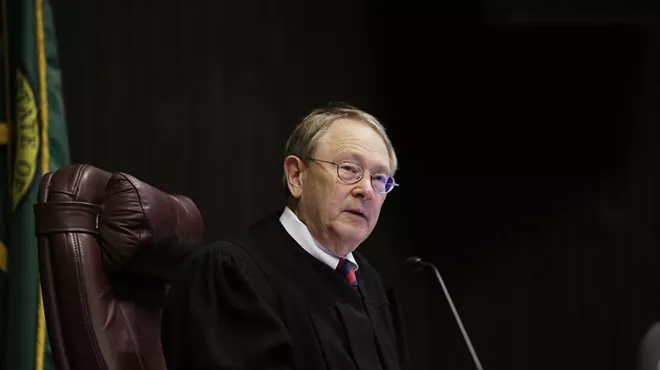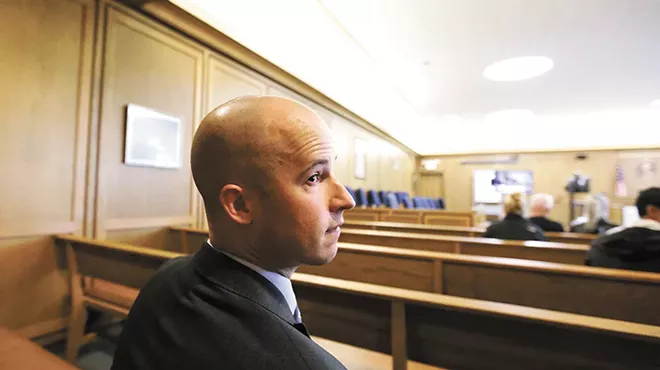Monday, January 29, 2018
Sen. Mike Padden's bill on pee tests is unconstitutional, Spokane attorney says
If you're arrested for drunk driving in Washington state, a judge can order you to stop drinking and doing drugs until the charge is resolved. But the way in which a judge can monitor that restriction is up for debate.
In a 5-4 decision last year, the Washington State Supreme Court ruled that random urinalysis tests for people accused, but not yet convicted, of DUIs are unconstitutional. Pee tests are too invasive, the majority ruled.
Secondly, the court pointed out that state law only allows for that level of pretrial testing for felony charges or those people with prior DUI convictions.
In response to the Supreme Court's decision, Spokane Valley Sen. Mike Padden has introduced Senate Bill No. 5987, which would allow judges to order random pee tests for those accused of drunk driving.
"Based purely on a technicality, the state Supreme Court held that a judge can't require a person arrested for a DUI to abstain from, and randomly test for, alcohol," Padden says through a spokesman via email. "Our bill is a
Not everyone agrees with Padden's rationale.
The Spokane attorney who argued the case before the state Supreme Court says Padden's bill is an attempt to sidestep the court's ruling, and therefore is unconstitutional. The legislature cannot enact a law that would overrule a Supreme Court decision, Spokane County public defender Michael Vander Giessen says.
"It's such a fundamental concept of constitutional law, I'm surprised Sen. Padden would go to this point," Vander Giessen says. "He knows better. It strikes me as disrespect for the judiciary and its role."
Jaime Hawk, a legal strategy director for the ACLU of Washington, shares Vander Giessen's concern.
"Violating our state constitution is not a technicality," Hawk writes via email. "The Supreme Court of Washington established court rules regarding when those who are presumed innocent should be released before their day in court. The proposed bill exceeds the scope of our court rule and seeks to expand the basis in which a court can detain someone or limit their freedom pretrial."
Padden, who used to serve as a Spokane County District Court judge, notes that prosecutors and judges have testified in support of his bill. Part of their argument is that judges might feel more confident releasing people from jail before trial, if they can be assured the defendant will follow the court's restrictions.
"While ultimately the courts will have to decide matters of constitutionality, legal experts with whom I have discussed the matter are confident that the bill is indeed constitutional," Padden says through a spokesman.
There is some question, Vander Giessen adds, over how broadly the Supreme Court's ruling will apply. Specifically, the high court considered three DUI cases in Spokane. Two of the three defendants had no prior DUI convictions, and the third had been accused of a marijuana-related DUI.
In each case, Spokane Judge Greg Tripp, who is now retired, imposed random monthly urinalysis testing. Defense attorneys took issue with those conditions because there was no evidence, in at least two of the cases, that the defendants would not comply with the court's orders to abstain from alcohol.
Ultimately, the Supreme Court ruled that state law did not allow Judge Tripp to impose the random tests, while also declaring urinalysis tests overly intrusive for defendants.
One potential alternative, Vander Giessen says, is a transdermal bracelet — a device that can detect whether a person consumes alcohol.
"I think those would qualify as constitutional," Vander Giessen says. "It might be good public policy to use something like that. The hardcore alcoholics who cannot stop drinking may really benefit."
Hawk, with the ACLU, notes that Spokane has become a pilot project of sorts for pretrial and bail reform efforts statewide. Efforts to expand Spokane's Office of Pretrial Services, and develop and implement an algorithm to assess defendants' risk to reoffend, are a couple examples (though Hawk says she has some concerns about the assessment tool).
A statewide task force to study and address potential issues with Washington's pretrial practices launched last summer.
"From a policy perspective, it's a challenging area," Hawk says. "There are some real separation of powers issues here. Our position is that this is an area that the courts typically have control over. The legislature has some role in pretrial release, but it needs to comport with the court rules."
Tags: Washington state legislature , Mike Padden , Greg Tripp , pretrial , DUI , small claims , child endangerment , News , Image




















